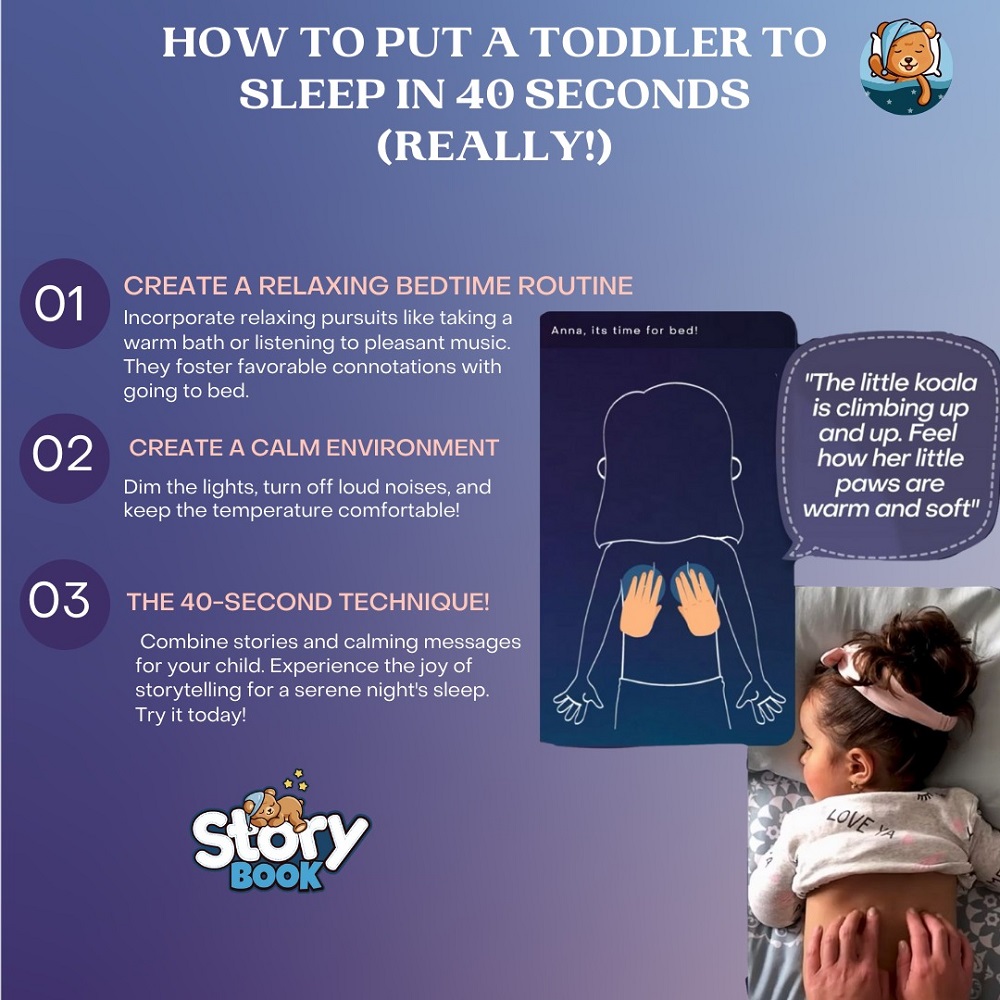Establish a Consistent Bedtime Routine
Getting your toddler to sleep until 7 AM starts with a consistent bedtime routine. This can signal to your child that it’s time to wind down. Here are steps to establish a calming routine.
- Set a Specific Bedtime: Choose a time for your toddler to go to bed each night and stick to it.
- Pre-sleep Activities: Engage your toddler in relaxing activities, like a warm bath or reading a book.
- Consistency is Key: Perform the same activities, in the same order, every night.
- Calm Environment: Keep the bedroom environment quiet and soothing as bedtime approaches.
- Say Goodnight: End the routine with a specific goodnight ritual, like a kiss or a cuddle.
By maintaining a stable routine, your toddler starts to associate these activities with sleep, making it easier for them to relax and drift off. Remember to be patient and consistent; it can take time for toddlers to adapt to new habits.

Create an Ideal Sleeping Environment
Creating an ideal sleeping environment is crucial for encouraging toddlers to sleep until 7 AM. This involves several easy-to-implement steps:
- Keep it Dark: Use blackout curtains or shades to block out early morning light. This encourages your toddler to stay asleep until it’s time to wake up.
- Control the Temperature: Make sure the room is not too hot or cold. A comfortable temperature for sleeping is typically between 65-70 degrees Fahrenheit.
- Choose Comfortable Bedding: Soft, breathable bedding can help your toddler feel cozy and secure throughout the night.
- Limit Noise: Reduce noise levels with a white noise machine or by ensuring a quiet household during bedtime hours.
- Remove Stimulating Toys: Keep toys that cause excitement out of the bedroom to create a calm space.
Creating a tranquil environment for sleep can greatly increase the chances that your toddler will sleep until the desired time in the morning. Paying attention to these details helps set the stage for a restful night.
Adjust Nap Times Accordingly
To help your toddler sleep until 7 AM, adjusting nap times can be beneficial. It’s important to balance daytime sleep to ensure it doesn’t interfere with nighttime rest.
- Monitor Nap Lengths: Keep naps short, around 1-2 hours, to prevent them from being too refreshed late at night.
- Set a Nap Schedule: Aim for a consistent nap schedule that complements the bedtime routine you’ve established.
- Early Afternoon Naps: Schedule naps for early afternoon rather than late afternoon to avoid affecting bedtime.
- Stay Consistent: Try not to skip naps as this can lead to overtiredness and difficulty falling asleep at night.
By fine-tuning nap times, you create a better balance between daytime and nighttime sleep, increasing the likelihood your toddler will sleep until 7 AM. Regular naps contribute to overall sleep quality, but their timing and duration are key factors to consider for nighttime sleep success.
The Role of Diet and Exercise
A proper diet and regular exercise play a crucial role in helping toddlers sleep until 7 AM. Consider these tips to help regulate your toddler’s sleep patterns through nutrition and activity.
- Balanced Diet: Ensure your toddler eats balanced meals throughout the day. Include whole grains, proteins, fruits, and vegetables.
- Avoid Sugary Snacks Before Bed: Sugar can give toddlers a burst of energy. Limit sweets, especially in the evening.
- Eat Dinner Early: An early dinner allows time for digestion before bed. Aim to finish mealtime at least 2 hours before sleep.
- Consistent Meal Times: Stick to regular times for meals and snacks. This helps set a natural body rhythm.
- Encourage Physical Activity: Active play during the day can make falling asleep easier for toddlers at night.
- Limit Screen Time: Too much screen time can affect sleep. Encourage playtime away from screens, especially before bed.
By focusing on nutritious meals and enough physical activity, toddlers are likely to feel sleepy by bedtime. Balanced diets and exercise routines align their bodies’ clocks towards a full night’s sleep. Remember that changes in diet and activity levels might take some time to show results in sleep patterns.

Parental Attitudes and Approaches to Bedtime
The way parents approach bedtime can greatly affect their toddler’s ability to sleep until 7 AM. Here’s how parental attitudes and practices make a difference:
- Stay Positive: Keep a cheerful demeanor as bedtime approaches. This helps reduce stress for your toddler.
- Be Calm and Firm: If your toddler resists bedtime, remain calm but firm about the routine.
- Practice Patience: Understand that some nights will be harder than others; patience is essential.
- Offer Reassurance: Sometimes toddlers need extra comfort. Reassure them with a soothing voice or a gentle hug.
- Avoid Negative Associations: Don’t use bedtime as a threat or punishment. It should be seen as a peaceful time.
- Model Good Habits: Show your toddler that you have a consistent bedtime routine of your own.
Parents’ consistent, positive, and patient attitudes toward bedtime are vital. They help toddlers feel secure and understand the importance of a good night’s rest. Learning how to get a toddler to sleep until 7 AM often starts with how parents handle bedtime.
Understand and Address Common Sleep Disruptors
To enhance your toddler’s chances of sleeping until 7 AM, you need to identify and handle common sleep disruptors effectively. Here is a list of typical issues and how to address them:
- Teething Pain: Use a cold teething ring or consult your pediatrician for pain relief options.
- Illness: If your toddler is sick, offer extra comfort and follow your doctor’s advice.
- Overstimulation: Avoid exciting play before bedtime. Choose calm activities to wind down.
- Hunger: Provide a light snack if your toddler is hungry before bed, but avoid heavy meals.
- Thirst: Leave a small water bottle by the bed, but discourage large amounts of liquids before bedtime to prevent nighttime wakings for the bathroom.
- Separation Anxiety: Provide a favorite toy or blanket for comfort if your toddler is anxious about being alone.
By anticipating these common sleep disruptors and having a plan to address them, you can significantly improve the quality of your toddler’s sleep. Each child is different, so it’s important to watch for signs and find solutions that work for your toddler’s unique needs.

The Benefits of a Good Night’s Sleep for Toddlers
Ensuring that toddlers get sufficient sleep is essential for their overall health and development. A good night’s rest offers numerous benefits that foster both physical and mental well-being.
- Supports Growth: Sleep is a crucial time when growth hormones are released. This helps toddlers grow strong and healthy.
- Improves Learning: A well-rested brain is more alert and ready to learn. Adequate sleep allows toddlers to absorb new information better.
- Boosts Immunity: During sleep, the body repairs itself, strengthening the immune system. This helps toddlers fight off illnesses more effectively.
- Enhances Mood: Sleep can stabilize emotions. Toddlers who sleep well are often happier and more manageable during the day.
- Aids in Heart Health: Quality sleep contributes to cardiovascular health, keeping toddler’s hearts strong.
- Promotes Healthy Weight: Proper sleep helps regulate hormones that control hunger, helping prevent obesity.
A well-rested toddler is generally more curious, energetic, and eager to interact with the world around them. Parents can take solace in knowing that by using gentle strategies to extend their toddler’s sleep until 7 AM, they’re contributing positively to their child’s long-term health and happiness. Regular sleep patterns also make for a more harmonious household, as everyone gets to start the day refreshed and ready to go.
When to Seek Professional Help
Sometimes, despite your best efforts using the strategies above, your toddler may still struggle with sleep. Knowing when to seek professional help can ensure your child gets the support they need. Here are signs that it might be time to consult a sleep specialist or pediatrician:
- Persistent Wakefulness: If your toddler consistently wakes up before 7 AM regardless of bedtime routines, it might be more than a habit.
- Frequent Night Waking: Regular interruptions in sleep or difficulty returning to sleep after waking may require professional insight.
- Observable Distress: Should your toddler show signs of distress or anxiety around bedtime, this could hint at deeper issues.
- Daytime Fatigue: If proper sleep hygiene practices are in place yet your toddler is still tired during the day, seek advice.
- Unusual Sleep Behaviors: Sleepwalking, night terrors, or other unusual behaviors are red flags for underlying sleep disorders.
Professionals can offer targeted strategies or identify any medical conditions affecting your toddler’s sleep habits. Sometimes, a fresh perspective or a tailored approach is all it takes to help your little one get the rest they need. If you’re concerned about your toddler’s sleep, don’t hesitate to reach out for professional help.
